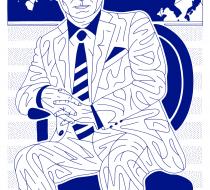Spengler and the Decline of Russia Favorite
“Spengler and the Decline of Russia”
105 NY-110, Melville, NY 11747
November 6, 11 am – December 1, 7 pm
Tuesday – Saturday, 11 am – 7 pm, free admission
Please write to racc.ny@mail.ru or call (347) 662 1456
The artist is available for interviews
100 years after the publication of “Decline of the West” by Oswald Spengler, a German historian and philosopher of history, Russian American Cultural Center presents “Spengler and the Decline of Russia”, an exhibition of collages by Dmitry Borshch. The artist is trying to apply some of the historian’s ideas about the West, including North America, to contemporary East, mainly Russia, parts of Russian-speaking Ukraine, Belarus. The first volume of Decline, published in 1918 and subtitled Form and Actuality, mentions Russia infrequently – once in a footnote where Spengler talks about its separateness from Europe and the hostility of the former, expressed by such writers as Tolstoy, Aksakov, and Dostoevsky, toward latter. Some of their writings that may be perceived as hostile to the West are rendered calligraphically by Borshch in this exhibition. The second volume, published in 1922 and subtitled World-historical Perspectives, contains a larger number of mentions of Russia that Dmitry views as often outdated, inaccurate – they are also presented in his calligraphic handwriting on sheets of various size and color. Relying on Spengler’s ideas about a culture’s lifespan, he argues that Russia today is an early civilization. “I started with two phenomena clearly observable now: the decline of Russian culture when compared to its peak – Golden through Silver ages of Russian literature (it being the country’s foremost art) and Caesarism – the rule of Vladimir Putin. The first phenomenon is partly based on emigration of “cultured” individuals from Russia after the breakup of the Soviet Union and they continue to emigrate. The second is a feature of civilizational life, not cultural, according to Spengler, who wrote that Caesar always defeats “money politics”. This is epitomized by the arrest, conviction, and imprisonment of Mikhail Khodorkovsky whose portrait is in the exhibition; I met him two years before making it,” says the artist, then adds, “When compared to Soviet Russia at the peak of its strength, today’s Russia is weaker militarily, economically, politically, diplomatically, and culturally, so the Decline is acknowledged even by Russian nationalists…” Sometimes called the prophet of alternative (or alt) right, Spengler thought that Western nations may become Caesarist in the 2000s. Is Donald Trump, whose portrait closes our exhibition, an American Caesar? Borshch answers the question with a firm “no”.
Dr. Regina Khidekel curated “Spengler and the Decline of Russia” at RACC’s new satellite space in Melville, New York. The exhibition is supported by funds from New York State Council on the Arts, New York City Department of Cultural Affairs in partnership with the City Council, and Materials for the Arts.
Russian American Cultural Center (520 East 76th Street, Suite 7E New York, NY 10021) aims to provide permanent cultural representation to more than 700,000 Russian-speaking residents of New York. It was founded in 1998 by Dr. Regina Khidekel and earned its 501(c)(3) tax-exempt status in 1999. RACC has adopted and broadened the strategy of organizations like No Longer Empty (http://www.nolongerempty.org/) which invigorate neighborhoods by mounting exhibitions in their unutilized or temporarily underutilized spaces. Visitors coalesce around a space where art may never have been exhibited before.
Regina Khidekel received her PhD from St. Petersburg Academy of Fine Arts, became the director of that city’s Diaghilev Art Center in 1990, and in 1998 the founding director of the Russian American Cultural Center in New York. She is the author of “It’s the Real Thing” (1999, University of Minnesota Press), and has contributed essays to the following publications: “Lyubov Popova” (1994), “Lazar Khidekel: Suprematism and Architecture” (1995), “Sterligov Group: Paintings from Russia” (1995), “Russian Constructivist Roots: Present Concerns” (1997), “Forbidden Art” (1998), “Lev Meshberg” (1999), “Tamar Hirschl” (2000), “In Malevich’s Circle” (2000), “A Life of Colors” (2001), “Surviving Suprematism” (2004), “Family Album. Artists from St. Petersburg” (2006), “Anna Rochegova” (2008), “Homage to Diaghilev’s Enduring Legacy” (2009), “Trajectory of Suprematism” (2011), “Floating Worlds and Future Cities: Lazar Khidekel, Suprematism and Russian Avant-garde” (2013), “Building Drawings and Drawing Buildings” (2014), “Lazar Khidekel and Suprematism” (2014). She has lectured at many universities, and curated many exhibitions.
Dmitry Borshch was born in Dnepropetrovsk, studied in Moscow, today lives in New York. His drawings and sculptures have been exhibited at the National Arts Club (New York), Brecht Forum (New York), Exit Art (New York), CUNY Graduate Center (New York), Salmagundi Club (New York), ISE Cultural Foundation (New York), Williamsburg Art and Historical Center (New York), Triangle Arts Association (New York), Parish Art Museum (Southampton), International Human Rights Law Institute of DePaul University (Chicago), the State Russian Museum (Saint Petersburg), Central Exhibition Hall “Manege” (Saint Petersburg), Frieze Art Fair (London).
http://www.russianamericanculture.com/galleries/emerging-artists/dmitry-...
About the image:
“Putin (without Crimea)” 2014, ink on paper and collage, 38 x 18 inches







